p auline Edwards started her working life as a secretary—by no
Page 70
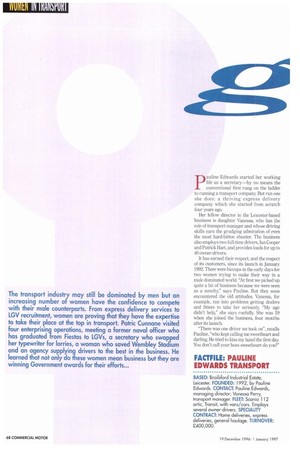
Page 71
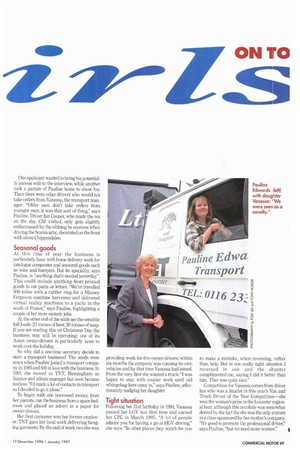
Page 72
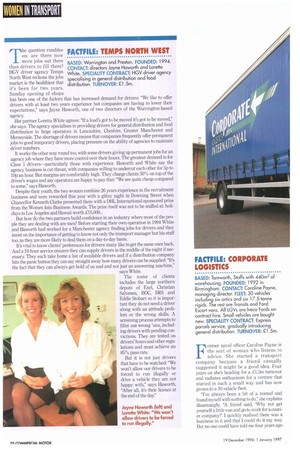
Page 73
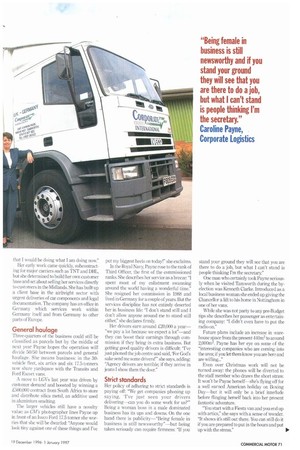
Page 74
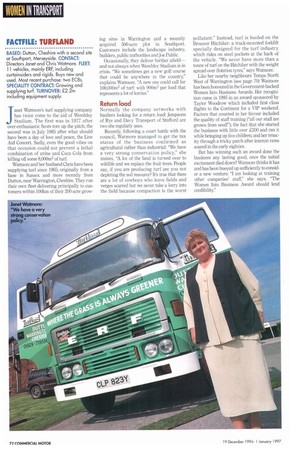
If you've noticed an error in this article please click here to report it so we can fix it.
means the conventional first rung on the ladder to running a transport company. But run one she does: a thriving express delivery company which she started from scratch four years ago.
Her fellow director in the Leicester-based business is daughter Vanessa, who has the role of transport manager and whose driving skills earn the grudging admiration of even the most hard-bitten shunter. The business also employs two full-time drivers, Ian Cooper and Patrick Hart, and provides loads for up to 40 owner-drivers.
It has earned their respect, and the respect of its customers, since its launch in January 1992. There were hiccups in the early days for two women trying to make their way in a male dominated world. "At first we picked up quite a bit of business because we were seen as a novelty," says Pauline. But they soon encountered the old attitudes. Vanessa. for example, ran into problems getting dealers and fitters to take her seriously. "My age didn't help," she says ruefully. She was 19 when she joined the business, four months after its launch.
"There was one driver we took on", recalls Pauline, "who kept calling me sweetheart and darling. He tried to kiss my hand the first day. You don't call your boss sweetheart do you?"
FACTFILE: PAULINE EDWARDS TRANSPORT BASED: Brailsfarcl Industrial Estate, Leicester. FOUNDED: 1992, by Pauline Edwards. CONTACT Pauline Edwards, managing director; Vanessa Perry, transport manager. FLEET: Scania 112 artic, Transit, with vans/cars. Employs several owner-drivers. SPECIALITY CONTRACT: Home deliveries, express deliveries, general haulage. TURNOVER: £400,000.
One applicant wanted to bring his potentially jealous wife to the interview, while another took a picture of Pauline home to show his. Then there were other drivers who would not take orders from Vanessa, the transport manager: "Older men don't take orders from younger men: it was that sort of thing," says Pauline, Driver Ian Cooper, who made the tea on the day CM visited, only gets slightly embarrassed by the ribbing he receives when driving the Scania artic, decorated on the front with silver Chippendales.
Seasonal goods
At this time of year the business is particularly busy with home delivery work for catalogue companies and seasonal goods such as wine and hampers. But its speciality; says Pauline, is "anything that's needed yesterday". This could include anything from printed goods to car parts or letters, "We've travelled 500 miles with a rubber ring for a Massey Ferguson combine harvester and delivered virtual reality machines to a yacht in the south of France," says Pauline, highlighting a couple of her more esoteric jobs.
At the other end of the scale are the sensible full loads: 23 tonnes of beer, 20 tonnes of soap. If you are reading this on Christmas Day the business may still be operating: one of its Asian owner-drivers is particularly keen to work over the holiday.
So why did a one-time secretary decide to start a transport business? The seeds were sown when Pauline joined a transport company in 1985 and fell in love with the business. In 1991 she moved to TNT, Birmingham as finance and admin manager but soon became restless: "I'd made a lot of contacts in transport so I decided to go it alone."
To begin with she borrowed money from her parents, ran the business from a spare bedroom and placed an advert in a paper for owner-drivers.
Her first customer was her former employer: TNT gave her local work delivering hanging garments. By the end of week two she was providing work for five owner-drivers; within six months the company was running its own vehicles and by that time Vanessa had joined. From the very first she wanted a truck: "I was happy to stay with courier work until old whingebag here came in," says Pauline, affectionately nudging her daughter.
Tight situation
Following her 21st birthday in 1994, Vanessa passed her LGV test first time and earned her CPC in March 1995. "A lot of people admire you for having a go at HGV driving," she says. "In other places they watch for you to make a mistake, when reversing, rather than help. But in one really tight situation I reversed in one and the shunter complimented me, saying I did it better than him. That was quite nice."
Competition for Vanessa comes from driver Ian who was a finalist in this year's Van and Truck Driver of the Year Competition—she won the women's prize in the Leicester regional heat, although this accolade was somewhat dented by the fact the she was the only entrant in a class sponsored by her mother's company. "It's good to promote the professional driver," says Pauline, "but we need more women,"
FACTFILE: CORPORATE LOGISTICS BASED: Tamworth, Staffs with 440m2 of warehousing. FOUNDED: 1992 in Birmingham. CONTACT: Caroline Payne, managing director. FLEET: 30 vehicles including six artics and six 17.5-tonne rigids. The rest are Transits and Ford Escort vans. All LGVs are lveco Fords on contract hire. Small vehicles are bought new. SPECIALITY CONTRACT: Express parcels service, gradually introducing general distribution. TURNOVER: 21.5m.
Former naval officer Caroline Payne is the sort of woman who listens to advice. She started a transport company because a friend casually suggested it might be a good idea. Four years on she's heading for a £1.5m turnover and radiates enthusiasm for a venture that started in such a small way and has now grown to a 30-vehicle fleet.
"I've always been a bit of a nomad and found myself with nothing to do," she explains disarmingly, "A friend said, 'Why not get yourself a little van and go to work for a courier company?' I quickly realised there was a business in it and that I could do it my way. But no one could have told me four years ago
that I would be doing what I am doing now."
Her early work came quickly, subcontracting for major carriers such as TNT and DBL., but she determined to build her own customer base and set about selling her services directly to customers in the Midlands. She has built up a client base in the airfreight sector with urgent deliveries of car components and legal documentation. The company has an office in Germany which services work within Germany itself and from Germany to other parts of Europe.
General haulage
Three-quarters of the business could still be classified as parcels but by the middle of next year Payne hopes the operation will divide 50/50 between parcels and general haulage. She means business: in the 30vehicle fleet, six artics and six 17.5-tonners now share yardspace with the Transits and Ford Escort vans.
A move to I.G Vs last year was driven by customer demand and boosted by winning a £500,000 contract from South Africa to store and distribute silica metal, an additive used in aluminium smelting.
The larger vehicles still have a novelty value: as C11/1's photographer lines Payne up in front of an Iveco Ford 17.5 tonner she worries that she will be dwarfed: "Anyone would look tiny against one of these things and I've
put my biggest heels on today!" she exclaims.
In the Royal Navy, Payne rose to the rank of Third Officer, the first of the commissioned ranks, She describes her service as a breeze: "I spent most of my enlistment swanning around the world having a wonderful time." She resigned her commission in 1988 and lived in Germany for a couple of years. But the services discipline has not entirely deserted her in business life: "I don't stand still and I don't allow anyone around me to stand still either," she declares firmly.
I-Ier drivers earn around £20,000 a year— "we pay a lot because we expect a lot"—and they can boost their earnings through commission if they bring in extra business. But getting good quality drivers is difficult: "I've just phoned the job centre and said, `For God's sake send me some drivers!" she says, adding: "Agency drivers are terrible; if they arrive in jeans I show them the door."
Strict standards
Her policy of adhering to strict standards is paying off: "We get companies phoning up saying, 'I've just seen your drivers delivering—can you do some work for us?'" Being a woman boss in a male dominated business has its ups and downs. On the one hand there is publicity—"Being female in business is still newsworthy—hut being taken seriously can require firmness: "If you stand your ground they will see that you are there to do a job, but what I can't stand is people thinking I'm the secretary" One man who certainly took Payne seriously when he visited Tamworth during the byelection was Kenneth Clarke. Introduced as a local business woman she ended up giving the Chancellor a lift to his home in Nottingham in one of her vans.
While she was not party to any pre-Budget tips she describes her passenger as entertaining company: "I didn't even have to put the radio on."
Future plans include an increase in warehouse space from the present 4401112 to around 2,000m. Payne has her eye on some of the "interesting companies who are coming into the area; if you let them know you are here and are willing..."
Even over Christmas work will not be turned away: the phones will be diverted to the staff member who draws the short straw. It won't be Payne herself—she's flying off for a well earned American holiday on Boxing Day—but it will only be a brief interlude before flinging herself back into her present fantastic adventure.
"You start with a Fiesta van and you end up with artics," she says with a sense of wonder. "It shows it's still out there. You can still do it if you are prepared to put in the hours and put
up with the stress." 111. BASED: Dutton, Cheshire with a second site at Southport, Merseyside. CONTACT: Directors Janet and Chris Watmore. FLEET: 11 vehicles, mainly ERF, including curtainsiders and rigids. Buys new and used. Most recent purchase: two EC8s. SPECIAUTY CONTRACT: Growing and supplying turf. TURNOVER: £2.2m including equipment supply.
Janet Watmore 's turf supplying company has twice come to the aid of Wembley Stadium. The first was in 1977 after over-enthusiastic Scots tore up the pitch; the second was in July 1985 after what should have been a day of love and peace, the Live Aid Concert. Sadly, even the good vibes on that occasion could not prevent a lethal combination of urine and Coca Cola from killing off some 8,000m2 of turf.
Watmore and her husband Chris have been supplying turf since 1965; originally from a base in Sussex and more recently from Dutton, near Warrington, Cheshire. They run their own fleet delivering principally to customers within 100km of their 200-acre grow ing sites in Warrington and a recently acquired 500-acre plot in Southport. Customers include the landscape industry, builders, public authorities and Joe Public.
Occasionally, they deliver further afield— and not always when Wembley Stadium is in crisis. "We sometimes get a new golf course that could be anywhere in the country," explains Watmore. "A new one could call for 100,000m2 of turf with 900m2 per load that represents a lot of lorries."
Return load
Normally the company networks with hauliers looking for a return load: Jempsons of Rye and Davy Transport of Stafford are two she regularly uses.
Recently, following a court battle with the council, Watmore managed to get the tax status of the business confirmed as agricultural rather than industrial: "We have a very strong conservation policy," she insists, "A lot of the land is turned over to wildlife and we replace the fruit trees. People say, if you are producing turf are you not depleting the soil resource? It's true that there are a lot of cowboys who leave fields and verges scarred but we never take a lorry into the field because compaction is the worst
pollutant." Instead, turf is loaded on the Brouwer Hitchiker: a truck-mounted forklift specially designed for the turf industry which rides on steel pockets at the back of the vehicle. We never have more than a tonne of turf on the Hitchiker with the weight spread over flotation tyres," says Watmore.
Like her nearby neighbours Temps North West of Warrington (see page 70) Watmore has been honoured in the Government-backed Women Into Business Awards. Her recognition came in 1995 in an award sponsored by Taylor Woodrow which included first class flights to the Continent for a VIP weekend. Factors that counted in her favour included the quality of staff training ("all our staff are grown from seed!"); the fad that she started the business with little over .£200 and ran it while bringing up five children; and her tenacity through a tricky patch after interest rates soared in the early eighties.
But has winning such an award done the business any lasting good, once the initial excitement died down? Watmore thinks it has and has been buoyed up sufficiently to consider a new venture: "I am looking at training other companies' staff," she says. "The Women Into Business Award should lend credibility."








































































































































